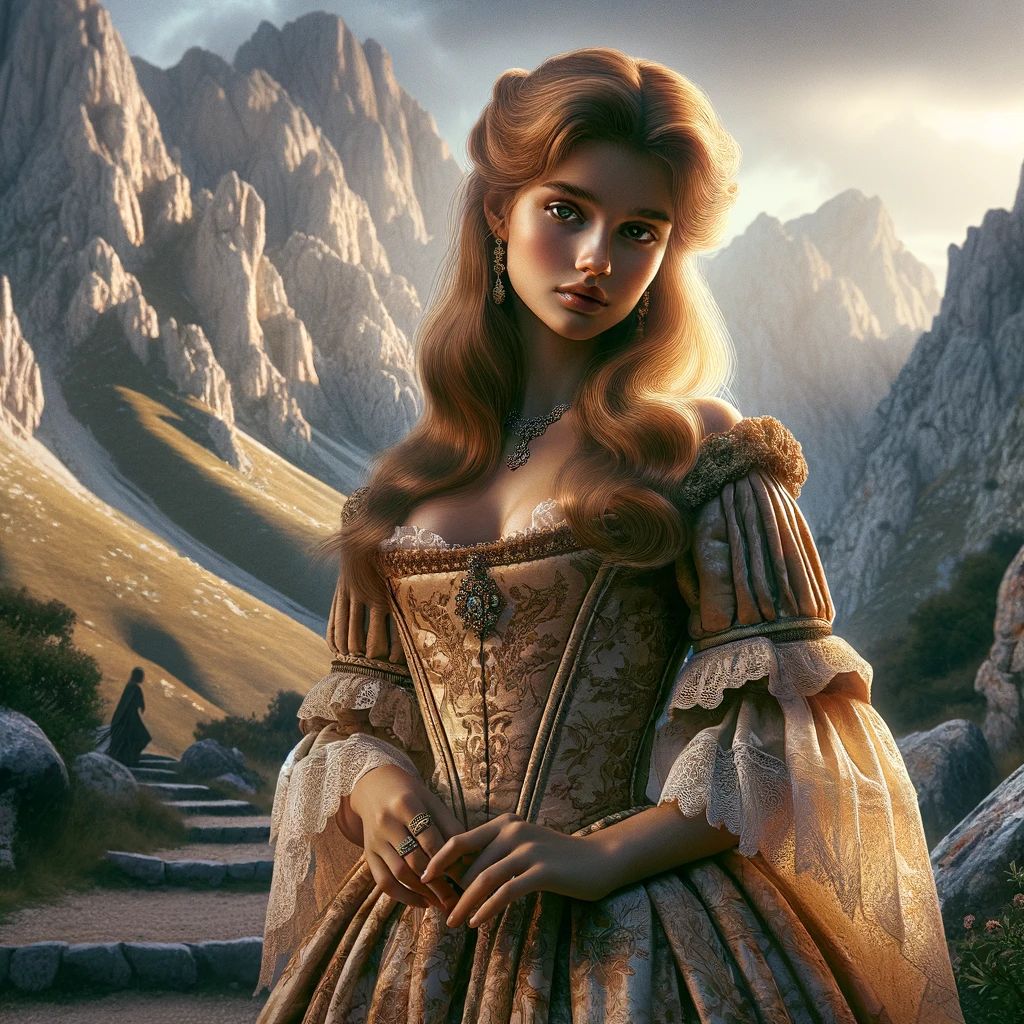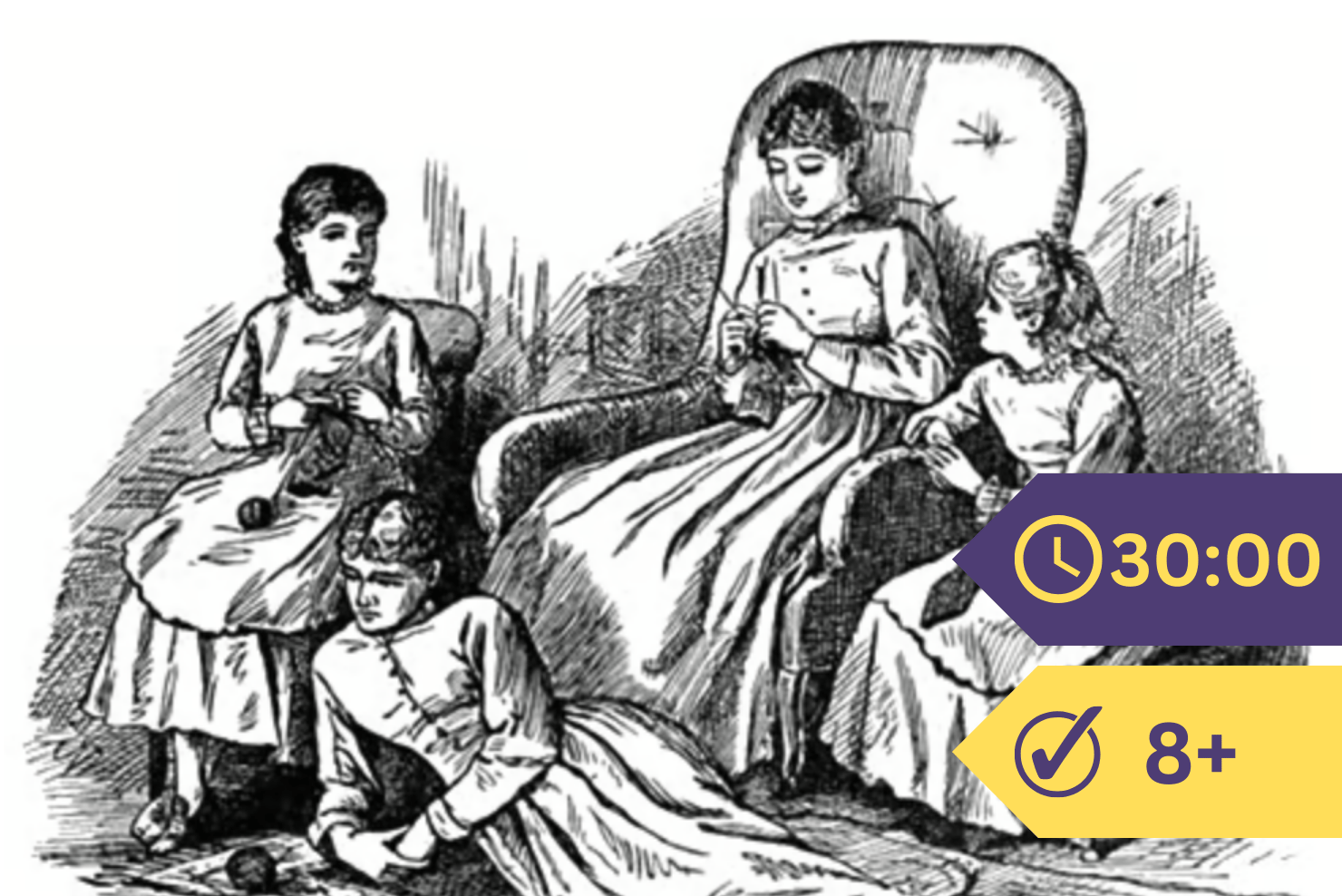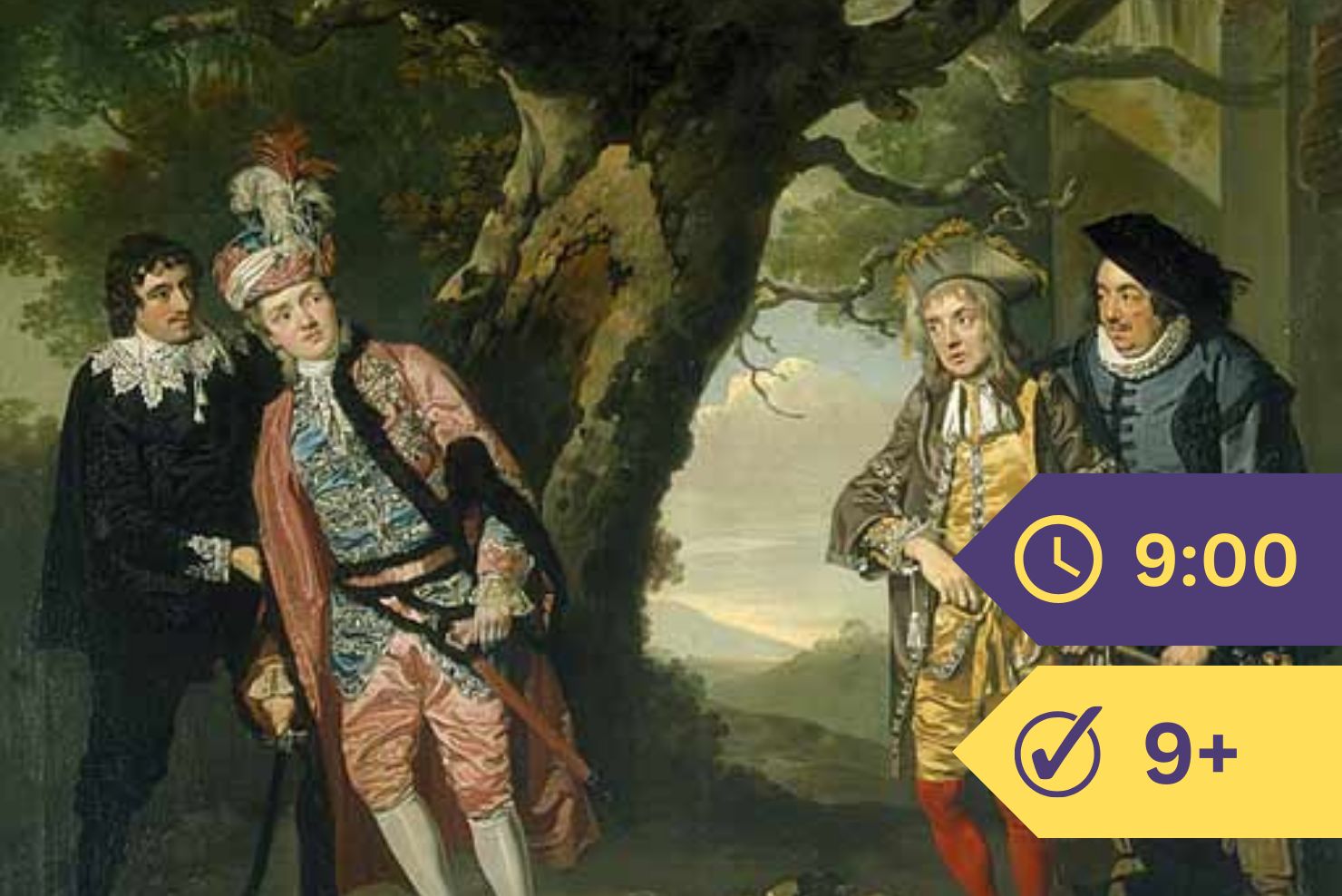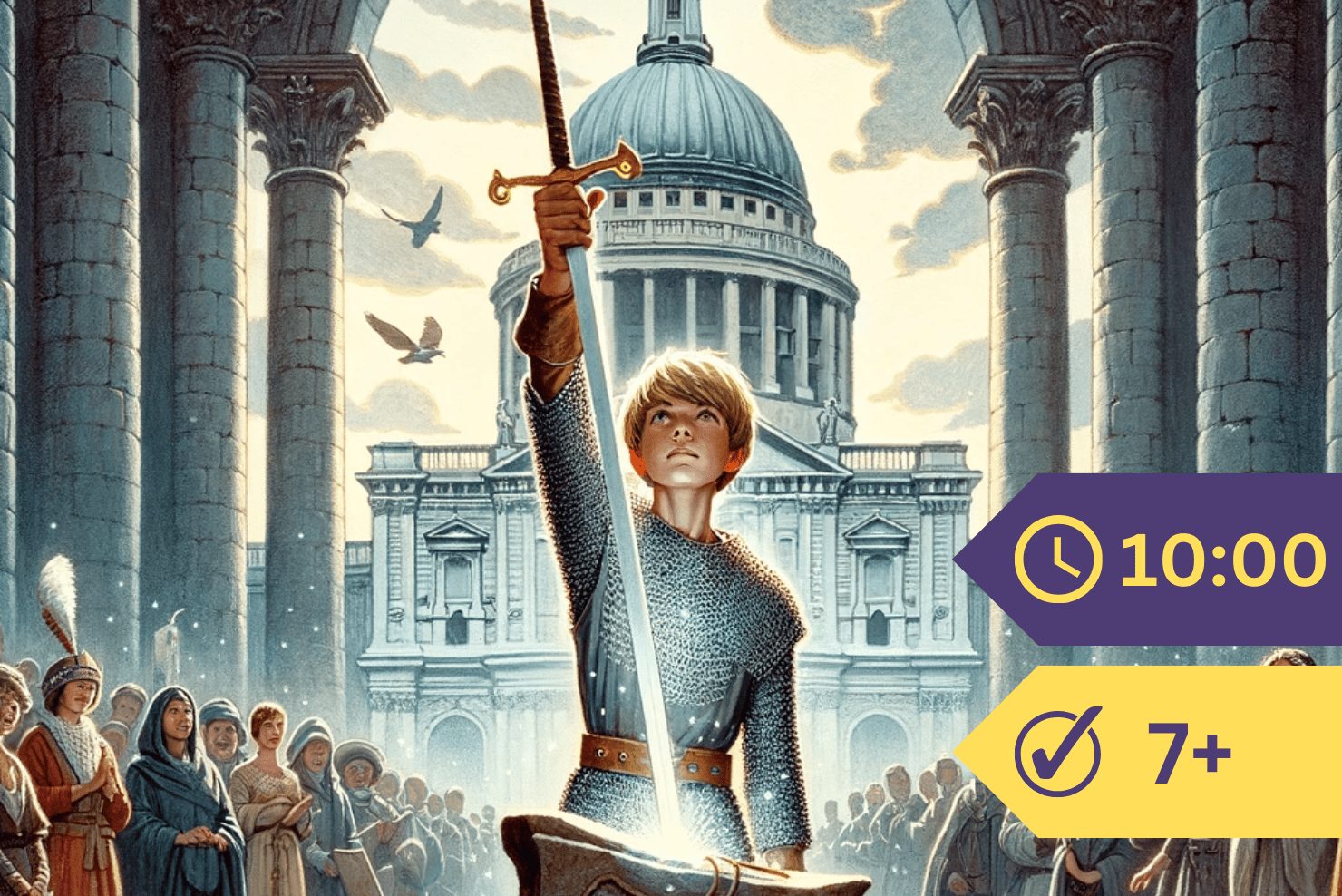When the unfortunate Dorothea had finished her story, she remained silent, her face flushed with sorrow; and as the priest was about to comfort her, Cardenio took her by the hand and said: “Lady, thou art the beautiful Dorothea, daughter unto rich Cleonardo.”
Dorothea was amazed when she heard her father’s name spoken by a person of such wretched appearance as Cardenio, and answered: “Who art thou, friend, that knowest so well my father’s name? For, unless I am mistaken, I did not once name him throughout all my story.”
“I am,” said Cardenio, “the unlucky one to whom Lucinda was betrothed; and I, too, had thought that I was without hope of comfort. But now I hear that Lucinda will not marry Fernando because she is mine, and Fernando cannot marry Lucinda because he is yours, it seems to me that there is yet some consolation for both of us. And I vow, on the faith of a gentleman, not to forsake you until I see you in the possession of Don Fernando.”
The curate now told them both the nature of his errand, and begged that they would join him in his travels, and stay as long as they pleased at his village. By this time they heard the voice of Sancho Panza, who, not finding them where he had left them, was calling out as loudly as he might.
They went to meet him, and asked for Don Quixote. Sancho told them that he had found him almost naked to his shirt, lean and yellow, half dead with hunger, and sighing for the Lady Dulcinea; and although he had told him that she commanded him to journey to Tohoso, yet he declared that he had made up his mind not to appear before her until he had done feats worthy of her great beauty.
The curate now returned and told Dorothea of their plan, and she at once offered to act the part of the distressed damsel, for she had a lady’s dress in the bundle which she carried.
“The sooner, then, we set about our work the better,” said the barber.
Dorothea retired to put on her robe of a fine rich woollen cloth, a short mantle of another green stuff, and a collar and many rich jewels which she took from a little casket. With these things she adorned herself so gorgeously that she appeared to be a princess at least. When Sancho saw her he was amazed, and asked the curate with great eagerness to tell him who the lady was, and what she was doing in these out of the way places.

“This beautiful lady, brother Sancho,” replied the curate, “is the heiress in direct line of the mighty Kingdom of Micomicon, who has come in search of thy master, to ask of him a boon, which is to avenge her of a wrong done by a wicked giant. And, owing to the great fame of thy master which has spread through all lands, this beautiful princess has come to find him out.”
“A happy searcher and a happy finding,” cried Sancho; “my master shall soon slay the great lubber of a giant, unless he turn out to be a phantom, for he has no power over those things. And when this is done, my lord shall marry the princess, whose name, by the bye, you have not yet told me, and by this means shall he become an emperor, and have islands to give away.”
“Her name,” replied the curate, “is the Princess Micomicona, and as to your master’s marriage, I will do what I can to help.”
Sancho was quite satisfied with these answers, and, when Dorothea had mounted the mule, he guided them towards the spot where Don Quixote was to be found. And as they went along, the barber told Sancho he must in no way pretend to know who he was, for if he did, Don Quixote would never leave the mountains and would never become an emperor. The curate and Cardenio remained behind, promising to join them again on the first opportunity.
Having travelled about three-quarters of a league, they found Don Quixote clothed, though still unarmed, sitting amidst the rocks. No sooner did Sancho tell Dorothea that this was his master than she whipped up her palfrey, closely followed by the well-bearded barber, who jumped from his mule, and ran to help his lady alight.
Quickly dismounting, she threw herself on her knees before Don Quixote, and refusing his efforts to raise her, spoke as follows: “Never will I rise from this position, most valiant and invincible knight, until you grant me a boon which will not only add to your honour and renown, but also assist the most injured and unfortunate damsel that ever the sun beheld. And if the valour of your mighty arm be equal to what I have heard of your immortal fame, you can indeed render aid to a miserable being who comes from a far-distant land to seek your help.”
“Beauteous lady,” replied Don Quixote, “I will not answer one word, nor hear a jot of your affairs, until you rise from the ground.”
“I will not rise, my lord,” answered the unfortunate maiden, “until I have obtained from you the boon I beg.”
“Dear lady,” replied Don Quixote, “it is granted, so that it be not anything that touches my duty to my king, my country, or the chosen queen of my heart.”
“Your kindness shall in no way affect them,” replied Dorothea.
At this moment Sancho came up and whispered softly in his master’s ear: “Sir, you may very well grant the request she asketh, for it is a mere nothing; it is only to kill a monstrous giant, and she that demands it is the Princess Micomicona, Queen of the great Kingdom of Micomicon in Ethiopia.”
“Let her be what she will,” said Don Quixote, “I will do my duty towards her.” And then turning to the damsel, he said: “Rise, most beautiful lady, for I grant you any boon you shall please to ask of me.”
“Why, then,” said Dorothea, “what I ask of you is, that you will at once come away with me to the place where I shall guide you, and that you promise me not to undertake any new adventure, until you have revenged me on a traitor who has driven me out of my kingdom.”
“I grant your request,” said Don Quixote, “and therefore, lady, you may cast away from this day forward all the melancholy that troubles you, for this mighty arm shall restore you to your kingdom.”
The distressed damsel strove with much ado to kiss his hand, but Don Quixote, who was a most courteous knight, would not permit it, and, making her arise, treated her with the greatest respect.
He now commanded Sancho to saddle Rozinante and help him to arm himself, and this done the knight was ready to depart. The barber, who had been kneeling all the while, had great difficulty to stop laughing aloud at all this, and his beard was in danger of falling off. He was glad to get up and help his lady to mount the mule, and when Don Quixote was mounted, and the barber himself had got upon his beast, they were ready to start. As for Sancho, who trudged along on foot, he could not help grieving for the loss of his Dapple; but he bore it all with patience, for now he saw his master on the way to marry a princess, and so become at least King of Micomicon, though it grieved him to think that that country was peopled by blackamoors, and that when he became a ruler his vassals would all be black.
While this was going on, the curate and Cardenio had not been idle. For the curate was a cunning plotter, and had hit on a bright idea. He took from his pocket a pair of scissors, and cut off Cardenio’s rugged beard and trimmed his hair very cleverly. And when he had thrown his riding-cloak over Cardenio’s shoulders, he was so unlike what he was before, that he would not have known himself in a looking-glass. This finished, they went out to meet Don Quixote and the others.
When they came towards them, the curate looked earnestly at the knight for some time, and then ran towards him with open arms, saying: “In a good hour is this meeting with my worthy countryman, the mirror of knighthood, Don Quixote of the Mancha, the champion of the distressed.”
Don Quixote did not at first know him, but when he remembered the curate he wanted to alight, saying: “It is not seemly, reverend sir, that I should ride whilst you travel on foot.”
But the curate would not allow him to dismount and give him his horse, but suggested that he might ride behind the lady’s squire on his mule.
“I did not think of that, good master curate,” said Don Quixote; “but I know my lady the princess will for my sake order her squire to lend you the use of his saddle.”
“That I will,” said the princess; “and I know my squire is the last man to grudge a share of his beast to this reverend father.”
“That is most certain,” said the barber, and got off his steed at once.
The curate now mounted, but the misfortune was that when the barber tried to get up behind, the mule, which was a hired one, lifted up her legs and kicked out with such fury that she knocked Mr. Nicholas to the ground, and, as he rolled over, his beard fell off and lay upon the earth. Don Quixote, seeing that huge mass of beard torn from the jaw without blood, and lying at a distance from the squire’s face, said: “This, I vow, is one of the greatest miracles I ever saw in my life. The beard is taken off as clean by the heel of the mule as if it had been done by the hand of a barber.”
The curate, seeing the risk they ran of their plan being found out, came to where Master Nicholas was lying, and with one jerk clapped it on again, muttering as he did so some Latin words, which he said were a charm for fixing on beards.
By this means, to Don Quixote’s amazement, the squire was cured again, and he asked the curate to tell him this charm, which, he said, since it could heal a wound of this kind, must be good for even more dangerous injuries.
The curate agreed to tell him the secret some other day, and, having mounted the mule, the party rode slowly away towards the inn.





